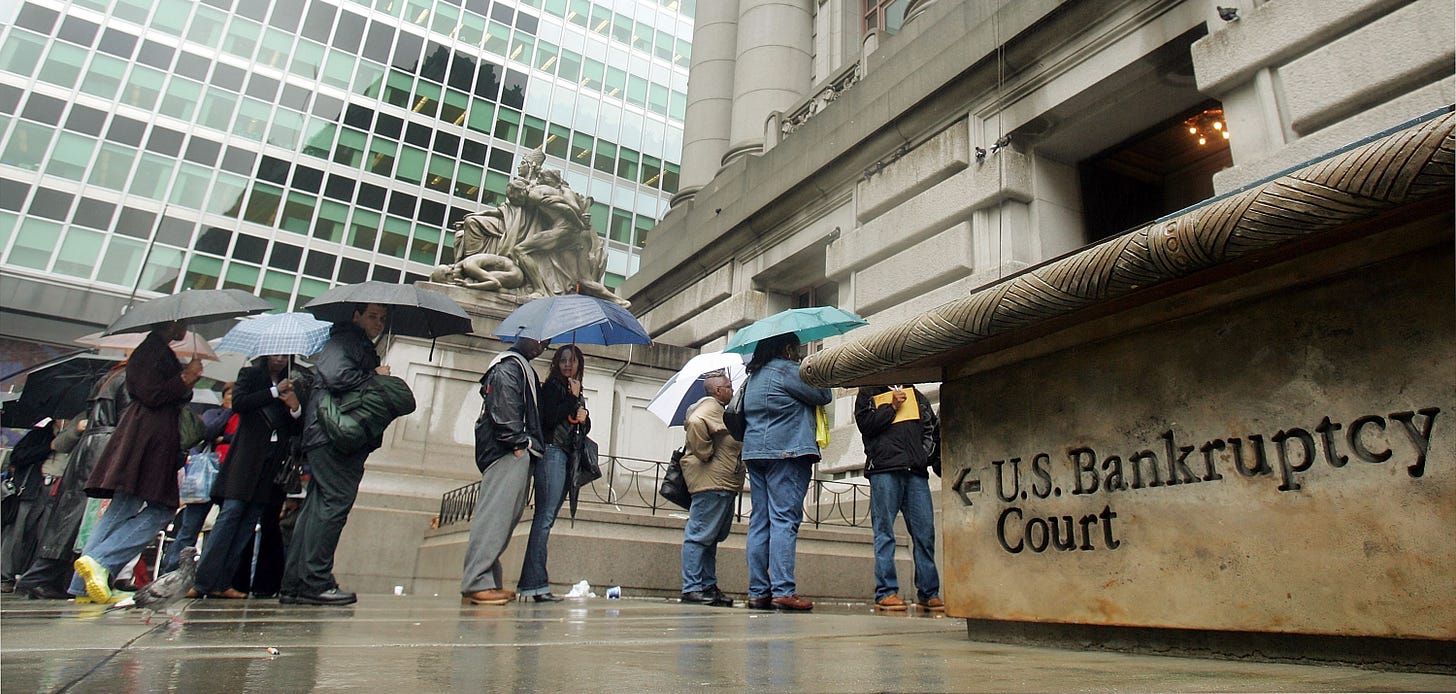Brace for Bankruptcies
With the bulk of Congress’s support due to expire, individuals and businesses could run out of options to stay solvent.

In the wake of the worst economic recession that the U.S. has experienced in the last 90 years and the worst health crisis in the past century, we now must brace ourselves for an impending bankruptcy crisis as well.
A tidal wave of bankruptcies is almost guaranteed if Dr. Fauci’s recent warning that the U.S. response to the pandemic is “going in the wrong direction” proves to be correct. It also doesn’t help that there might be no replacement for the support to companies and households under the $2.3 trillion CARES Act, which is due to lapse at the end of this month.
The staggering depth of the economic recession would be reason enough to fear a record rate of bankruptcies later this year. According to the IMF’s latest economic forecast, the U.S. economy could contract by as much as 8 percent in 2020 before partially recovering by 4.5 percent in 2021. This would be the worst recession that the country has experienced since the Great Depression, and it would leave unemployment above 10 percent for most of 2021.
The IMF cautions that, as gloomy as its baseline forecast might be, matters could be appreciably worse if the U.S. were to experience a second wave of the pandemic. (That “if” is looking more and more like a prayer.) That would almost certainly slow the pace at which the current restrictions on economic activity could be lifted. In that context, the recent surge in new infections in the South and West is a major cause for concern, especially for the human toll. While previous hot spots like New York are recovering, the nationwide daily infection rate is now back to its previous peak level.
Another reason to expect a major rash of bankruptcies is that the pandemic has hit some sectors of the economy much harder than others: Airlines, hotels, restaurants, brick-and-mortar stores, and other service-related industries have all been disproportionately hurt. Until a vaccine or treatment for COVID-19 becomes widely available, these parts of the economy will likely continue to bleed cash as they are forced to operate at a fraction of their normal capacity.
Other crucial, though less obvious sectors of the U.S. economy are also at risk. With international oil prices likely to remain low for as long as the global economy remains so weak, it’s only a matter of time before large swathes of the domestic shale oil industry need to file for bankruptcy. That industry employs 9.8 million people, or almost 6 percent of the U.S. workforce, according to the American Petroleum Institute.
Matters could be even worse for the commercial real estate sector. One of the likely long-run effects of the coronavirus pandemic is that it will accelerate the pace at which the U.S. economy was already becoming more digitized, with more employees working remotely and more businesses opting for virtual interaction over face-to-face meetings. With more shopping done online, will we really need so many brick-and-mortar stores? With more workers working from home, what happens to the existing stock of office space, garages, and public transit?
To date, despite the U.S. economy having recorded its worst quarterly performance on record, the pace of bankruptcies and defaults has been relatively contained. This should have been no surprise, since it takes time before companies burn through their cash reserves and exhaust their existing credit lines—not to mention the massive temporary support provided to both households and companies by Congress and the Federal Reserve.
But the major provisions of the CARES Act are about to come to an end. Without a generous replacement bill, households and businesses of all sizes could run out of options besides default.
To be sure, the Federal Reserve has been and can continue to be helpful in delaying bankruptcies by its massive credit market support. But as beneficial as the Fed’s lending has been, it’s hard to solve a debt problem by adding more debt to struggling companies’ balance sheets. If the Fed insists on trying to do so, it risks repeating the Japanese mistake of hobbling the economy with zombie companies and distorted credit markets.
Hopefully, U.S. economic policymakers will not allow the short-term bounce that is bound to accompany the lifting of lockdowns to blind them to the lurking danger of mass bankruptcies. Rather, they should lose no time to fashion some kind of support to replace the CARES Act.









